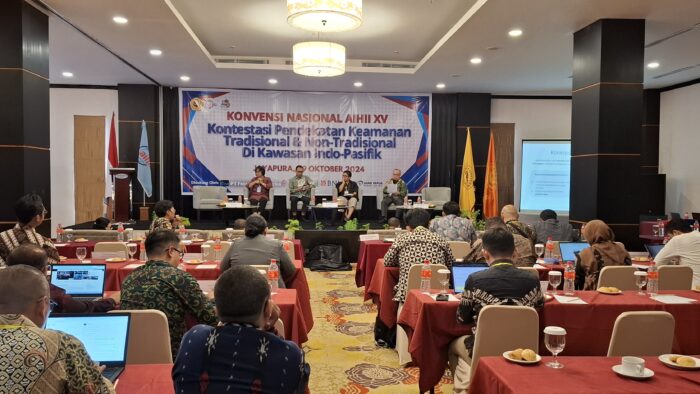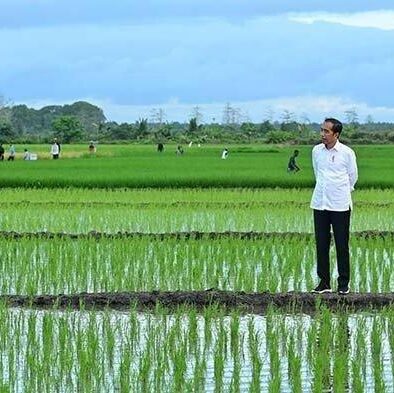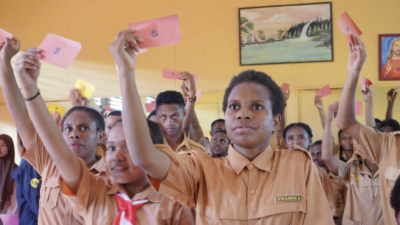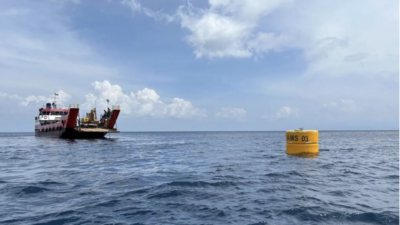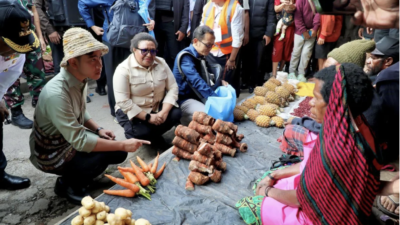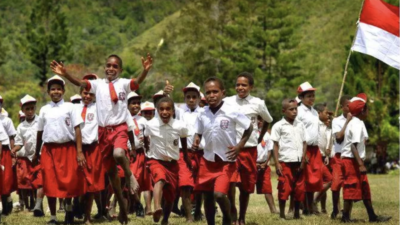Thelandofpapua.com – The 15th National Convention of the Indonesian Association of International Relations (AIHII) officially commenced in Jayapura on Wednesday, October 9, 2024, bringing together experts, academics, and professionals to discuss pressing strategic issues in the Indo-Pacific region.
This year’s convention is being hosted by Cenderawasih University, located in Papua, Indonesia. The theme centers around the contestation between traditional and non-traditional security approaches, reflecting the dynamic and evolving nature of security challenges faced by countries in the Indo-Pacific.
Participation and Scope
The event sees the participation of 74 delegates from 45 universities across Indonesia, all of which have International Relations programs that are members of AIHII. This wide representation highlights the significance of the convention, not only as an academic forum but also as a key platform for national collaboration.
The Rector of Cenderawasih University, Oscar Oswald Wambrauw, expressed pride in hosting this prestigious event. He emphasized the importance of such a convention for fostering collaboration and building networks across Indonesia’s academic landscape.
“Cenderawasih University is honored to be selected as the host of this convention. It provides an important platform for universities with International Relations programs to come together and address key issues relevant to both Indonesia and the wider Indo-Pacific region,” Oscar said in his opening remarks.
Key Issues on the Agenda
Oscar also noted that the discussions at the convention focus on a range of contemporary global challenges, including:
- Climate change: One of the most pressing global issues, particularly for the Indo-Pacific, which includes numerous vulnerable coastal and island nations.
- Peace and security: Discussions on how regional actors can contribute to maintaining stability in a region marked by complex geopolitical tensions.
- National security: Exploring how nations in the Indo-Pacific can balance traditional defense strategies with new threats like cyber warfare and terrorism.
- Immigration and human mobility: Addressing the migration patterns affecting both security and economic stability in the region.
- Economic inequality: The widening economic disparities both within and between countries, and their implications for regional cooperation.
- Digital revolution: How the rapid pace of technological change is reshaping diplomacy, security, and international relations.
These diverse topics highlight the need for multi-faceted approaches to security and diplomacy, especially as traditional definitions of power and threat are being redefined by technological advancements and global interconnectedness.
Collaboration and Knowledge Exchange
In addition to academic discussions, the convention emphasizes the importance of building networks and facilitating knowledge exchange among universities and academics. The aim is not only to address these urgent issues but also to foster innovation in solving them.
Oscar noted that annual conventions like this are essential for generating fresh ideas and strategies. “We must continually reassess and innovate in how we approach these issues, especially as they evolve over time. Conventions like this give us the chance to collaborate, share knowledge, and develop new approaches to dealing with these challenges,” he said.
The AIHII National Convention also serves as an opportunity for scholars, students, and professionals to develop long-term collaborations that can extend beyond the event itself, ensuring sustained engagement with the issues that matter most to the region.
The Significance of the Indo-Pacific
The Indo-Pacific region is of paramount importance in today’s global political landscape. With rising powers such as China and India, combined with longstanding regional players like Japan, Australia, and ASEAN countries, the Indo-Pacific is a center of strategic competition and cooperation.
Issues related to maritime security, the South China Sea disputes, and the role of major powers like the United States in the region were also anticipated topics of discussion. The region’s security environment is increasingly shaped by a complex mix of geopolitical rivalries, economic interdependence, and non-traditional security threats like climate change and pandemics.
The focus on both traditional and non-traditional security approaches reflects the region’s need for holistic strategies that address not only military and political concerns but also environmental and socio-economic challenges.
A Vision for the Future
Looking forward, the 15th AIHII National Convention is expected to generate not only insightful analyses but also concrete recommendations on how Indonesia and its neighbors can navigate the turbulent waters of the Indo-Pacific.
With its strategic location and growing influence, Indonesia plays a critical role in shaping the future of the region. The outcomes of this convention could help inform the country’s foreign policy, especially as it seeks to position itself as a mediator and leader in Indo-Pacific diplomacy.
Oscar concluded the opening ceremony by expressing his hope that the convention will contribute to building a resilient and peaceful Indo-Pacific: “Our goal is to use this platform to drive meaningful discussions and cooperation that will help shape a stable and prosperous future for the region.”
With vibrant discussions, collaborative projects, and a shared commitment to addressing both traditional and emerging threats, the AIHII National Convention in Jayapura is poised to make a significant impact on the way scholars, policymakers, and practitioners approach the Indo-Pacific’s challenges moving forward.

